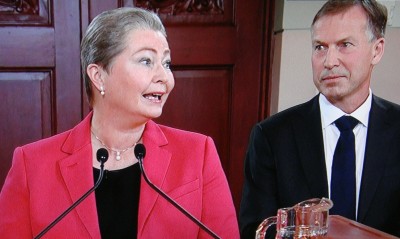The Norwegian Nobel Committee, under new leadership, surprised everyone on Friday by announcing that it would award this year’s Nobel Peace Prize to the Tunisian National Dialogue Quartet, for its role in building democracy in Tunisia. The winner had barely if at all been mentioned during weeks of speculation over prospective prizewinners, who ranged from Angela Merkel to the pope.

“The goal wasn’t to surprise, but we would like to keep the winner to ourselves,” the new leader of the Norwegian Nobel Committee, Kaci Kullmann Five, said right after she made the formal announcement. Five (pronounced “Fee-veh”) has sat on the committee since 2003 but just took over as its leader last spring in a move that demoted the former committee leader, Thorbjørn Jagland, who also leads the Council of Europe.
Given this year’s wide range of 273 confirmed candidates and the shortlists of those considered especially worthy of the prize, Five said the committee’s evaluation process was “just as difficult as it always is.” The winner was not selected until the final meeting of the committee just a week ago, and beat out candidates including Pope Francis, many involved in the refugee crisis including German Chancellor Angela Merkel, survivors of and activists against atomic bombs, Russian human rights activists and the key players involved in the Colombian peace process.
The choice of the Tunisian National Dialogue Quartet is a departure from far more high-profile and controversial recent winners who have figured highly in the news, such as US President Barack Obama just a year after he was elected and the European Union. The Nobel Peace Prize is often used, however, as a means of encouraging winners and perhaps helping them to succeed, criteria that Five said figured into this year’s choice.
Tunisian organizations and leaders of the country’s so-called Jasmine Revolution of 2011 have been nominated in the past and, reported Norwegian Broadcasting (NRK), were viewed as top candidates a few years ago, shortly after they’d been in the heat of battle. In that sense, the prize to the four civilian organizations behind the Quartet now was unexpected and can be seen as coming a bit late. Five insisted, though, that it was highly relevant because the Tunisian Quartet’s efforts prove, at a time of catastrophic conflicts in the Middle East and terrorist extremists, that “Islamist and secular political movements can work together to achieve significant results in the country’s best interests.” She added that the committee hopes the prize will help safeguard democracy in Tunisia and be an inspiration to everyone promoting peace and democracy. “More than anything, the prize is intended as an encouragement to the Tunisian people,” she said.
For the full text of the prize announcement, and the rationale behind it, click here.
It was the first time that new Nobel Committee leader Five was the one to announce the prizewinner, and she’d admitted earlier that she was likely to be fighting a nervous case of “butterflies” on the morning of the prize announcement. As a veteran politician who once led Norway’s Conservative Party, though, Five is not unaccustomed to being in the limelight and led off her remarks in probably the most clearly spoken English of any previous Norwegian Nobel leaders. Some haven’t wanted to speak English at all, and even conducted their Nobel lectures strictly in Norwegian.
Also making his debut on Friday was the committee’s new secretary and director of the Norwegian Nobel Institute, Olav Njølstad, who took over last winter for the retiring Nobel veteran Geir Lundestad but has stayed firmly in the background since. That’s also a sharp change from the outspoken Lundestad who left the job with a bang, commenting on various personal characteristics of Nobel committee members he’d worked with over the years and then promising to write a book.
Lundestad followed through with his book launched last month that set off anything but peace among players involved. He was accused of everything from character assassination to disloyalty to the committee and its tradition of secrecy around the Peace Prize, with the committee ultimately kicking Lundestad out of the office he’d still been allowed to use at the Nobel Institute in Oslo.
Some worried the controversy that’s swirled around the Norwegian Nobel Committee and the Nobel Institute would harm the Peace Prize, but international interest remains strong given the media turnout for Friday’s prize announcement in Oslo. Some historians and Nobel experts have said they think the conflict will soon be forgotten, while controversy around Nobel Peace Prize winners will continue, as many think it should.
Five refused to comment on the committee’s conflict with Lundestad, claiming that “this shall be the prizewinners’ day, not Lundestad’s day.”
newsinenglish.no/Nina Berglund

